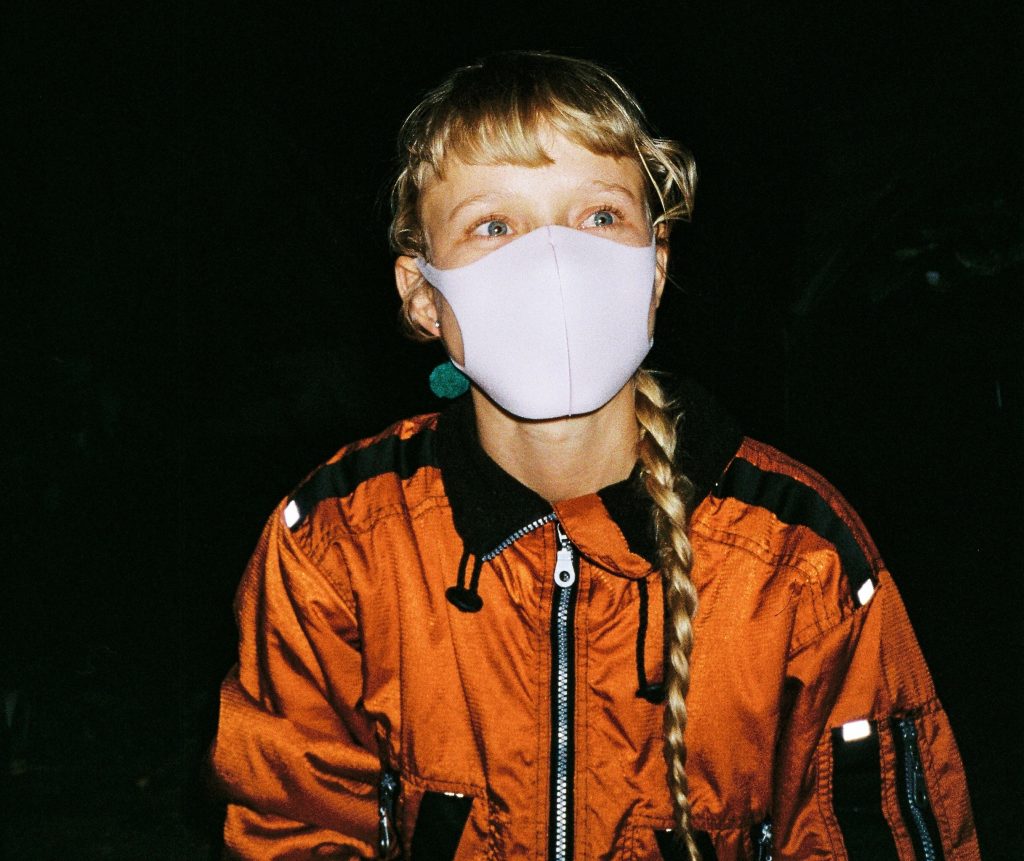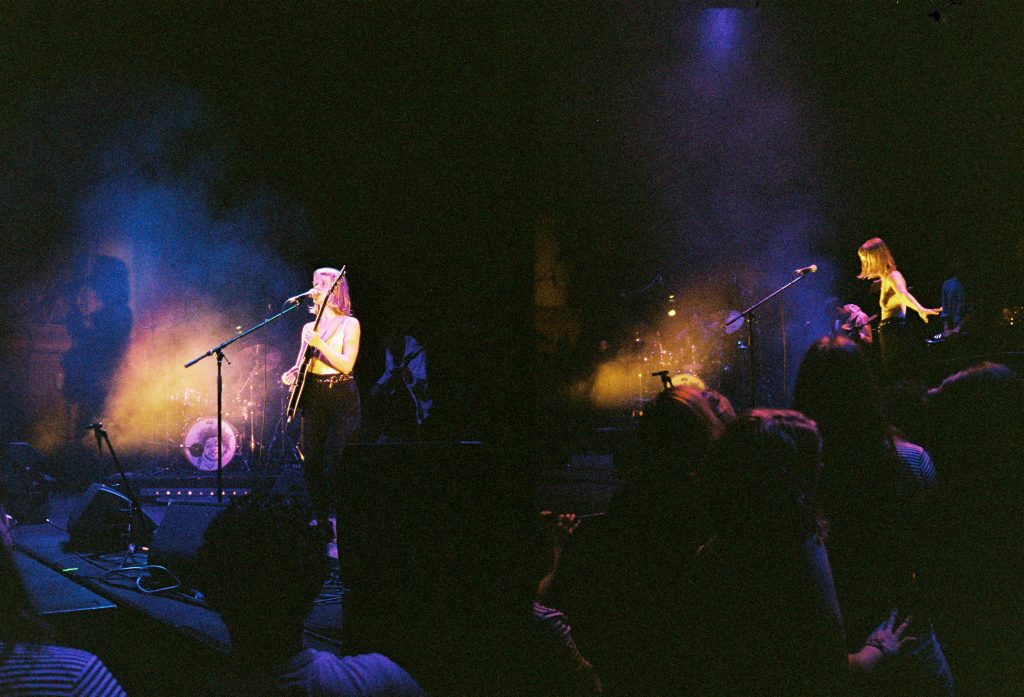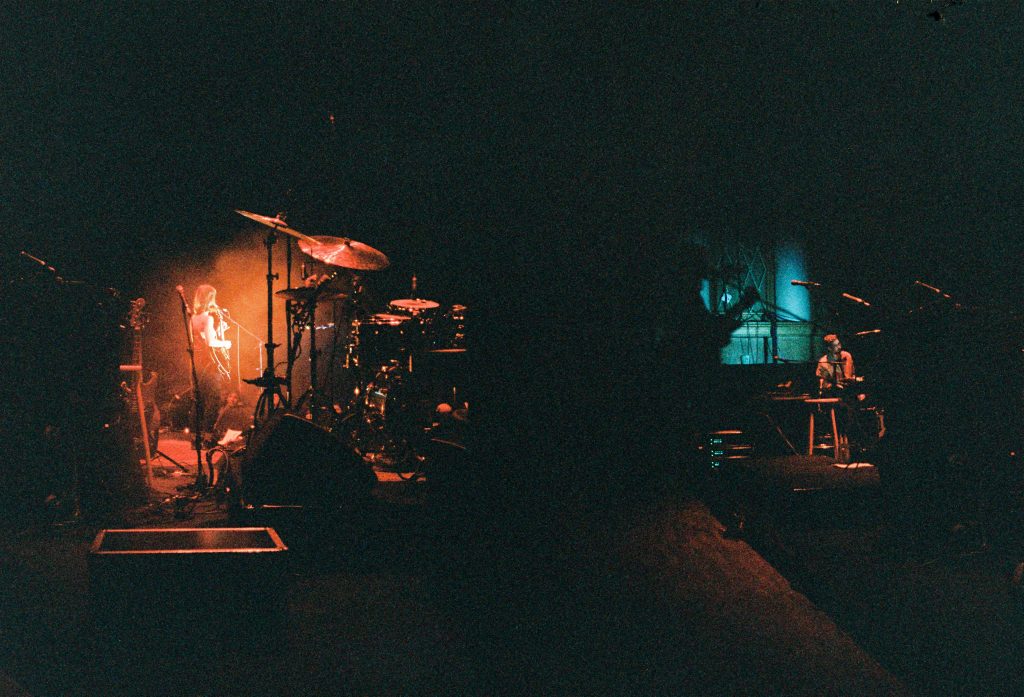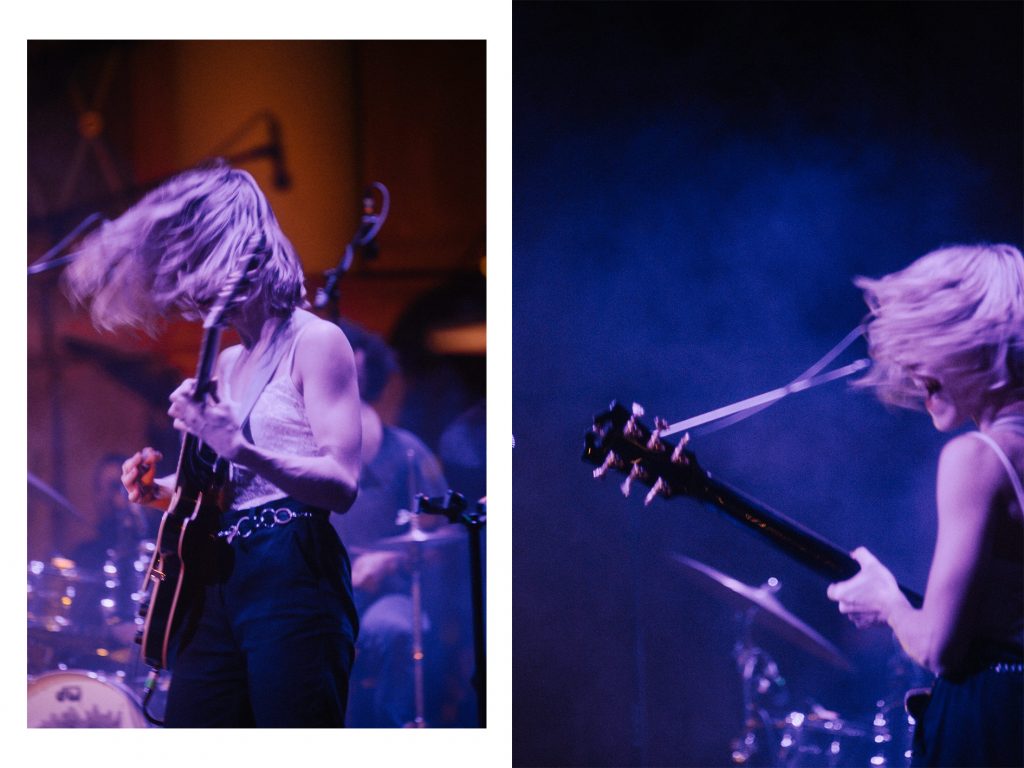
*This interview was originally published in Volume VIII, October 2020.
Interview by Robin Pailler | Photography by Jascha Muller-Guthof
With today marking the release of her new album Glow, which you can access via your favourite streaming platform here, we’re sharing our exclusive print interview from Volume VIII for your reading leisure.
When it comes to forging an independent career in such a truly self-made spirit, few have succeeded quite as well as Alice Phoebe Lou.
Having left her childhood home in Cape Town at just 19, the South African native moved to Berlin and immediately immersed herself in the flourishing cultural scene of Germany’s capital.
From busking on the streets in peak winter to playing sold out shows across North America, Europe & Japan (including the main stage at Primavera and even being shortlisted for Best Original Song at the 2018 Oscars), Alice has spent seven years cultivating a musical career few could ever dream of, whilst remaining 100% independent and true to her core aesthetic and beliefs. Most recently she’s formed a side project entitled strongboi, with her keyboard player Ziv, releasing three songs in quick succession this year, all with original music videos, whilst simultaneously releasing two singles under her original alias and writing her third solo album, due out next year. All in the midst of a global pandemic, whilst coming to terms with experiencing true heartbreak for the first time. We met for coffee on a quiet autumnal afternoon in her neighbourhood of Neukolln, to discuss the busiest year of her life, the knock-on affects of a cultural vacuum, why staying independent means so much and if moving back to her birthplace could ever be a possibility…
Obviously 2020 has been a whirlwind for the whole world but how has it been for you, both career-wise and personally?
Last year (2019) was the biggest touring year of my life. I did over 100 shows under Alice Phoebe Lou. And that’s not including the strongboi shows and street shows, which I still do. Not as much as I used to, but I probably did about 30 street shows last year. So if you do the maths, that’s like, every third day of the year. And I think sometimes people underestimate it, like…they see you on a stage, and they see the fruits of that, but they don’t realise that, including the travelling, the preparation, and everything in between, it really becomes your entire life. And it’s amazing, especially when you’re on a good buzz. But you know, you have your ups and downs. You get your period. You get a bit sick. And then you still have to play another show that night to people who are wanting to get something fresh from you, you know? And to keep that freshness you have to keep on it, keep alive, give people what they want. So yeah, last year was the most busy year of my life in that sense. And then conveniently, this year, there wasn’t as much planned other than a few festivals, a few shows and a festival that I was organising in Berlin, which all had to be cancelled. But I can very much understand most musicians who are on a different cycle, being very frustrated with all the things changing and closing, especially with shows being the main source of income for most musicians. But I wasn’t too affected by it. Which is lucky. I immediately just went into like, ‘Okay, that’s not looking like it’s possible. What else can I do with my time? I better focus more on songwriting and other stuff.’
But it’s been such a stark contrast, going from touring the world, across North America, Europe and Japan, to being in one place constantly. I’ve never spent this much time in Berlin actually. Usually I’m moving a lot. So it’s been a very confronting year. I live alone. Friendships have changed or evaporated or whatever. I’ve always been someone that’s very social and places social commitments above everything else, including my own needs. And so that’s changed a lot. So in that sense, I’m really grateful for the things that I’ve had to confront and that I might have only learned over the next few years. I had to adapt and learn quickly. At some point, I shaved my head, I guess that’s a symbol of what I’ve been going through, what I had to confront. And I feel like I did a lot of growth and a lot of self work this year. So yeah, in that sense, I’m very grateful. But obviously, those things have only been possible because I have some form of success that I can rely on in terms of making some sort of income. And I have a steady place to live and all of these things that I definitely don’t take for granted now. And a lot of people don’t have that, so things have been a lot more uncertain for a lot of people. I feel very fortunate that there’s been some sort of security.

Compared to your roots back in Cape Town, where South Africans suffered a very strict lockdown, you must’ve been quite relieved to have been in Berlin?
Totally. I’ve been here for almost 7 years now and have had many different moments of falling in love with the city. But never as wildly as this year, for sure. Because I spent so much time here, I got to feel all the seasons, I got to watch things day by day, feel more of a sense of community. But in general, I imagine most big cities, especially ones that have been hit hard by Coronavirus have experienced much tougher times, even just on a psychological level, with the sense of fear on the streets and the sense of hostility that comes from that fear between people. I think that fear and that tension and stress can so quickly just catch on. Even on a subconscious level. It can become so much more personal and so much harder to deal with. When your surroundings are like that, when the stress and the fear is so elevated. On that level, Berlin is such a good place to be because whatever is happening out in the world, whatever statistics are telling you, whatever the difference of opinions and things being thrown at you, at least in your neighbourhood, you feel safe and you feel in control of your environment. You feel like your neighbours got your back, you know? And that’s a real stress-reliever I think.
So I love being here. Also because of the use of public space and the fact that people are being relatively responsible and heeding the guidelines, etc. You can still just go for a walk along the canal in the sun and you can go into nature or you can meet someone on the street and have a späti beer if you want to.
You’ve clearly managed to focus on the positives with your time off but how do you feel about the long term affects of Covid for musicians, as well as the arts and culture in general?
It’s been fucked for most people. I think the scariest thing is to imagine the vacuum of culture, not just musically, but generally, that’s going to be left behind after this. Being in Germany is quite different, where the state immediately gave €5000 to all the artists and freelancers. There was a lot of like, difference of opinions of what that meant. But for me, it was just the fact that arts and culture is valued enough to allow people to get through this time, so that by the end of this time, when things are starting to get back to normal, at least people will not have changed their job dramatically into something else that is not in arts and culture. There’s been enough memes going around saying ‘try experiencing your lockdown without movies, or music and then you’ll realise how important artists are’ —that’s legit. We don’t realise the importance of art until there’s a vacuum of it. And I think in a lot of places in the world, there’s gonna be such a vacuum. I mean, there are some crazy ads going around in the UK right now with their “rethink, reskill, reboot” campaign.
And it’s like, NO! Support art and culture and make sure these things stay alive. The arts already have too little support. Artists are already undervalued in all different types of fields. And so this is going to have a huge knock-on affect. And I think the hardest thing is people having to really be even more creative, to think outside the box for ways to survive this pandemic, so that by the end of it, they can still continue making art.
The other thing is that it’s such a weird thing to navigate, because there’s this sense that you have to be ‘selling yourself’ even more than before—more presence on social media or whatever—in order to keep people engaged with you. And you’re fighting the algorithm constantly. You’re like, not wanting to pay Facebook to boost your shit, but you realise you’ve got like 90k followers on Facebook, and yet only a few hundred people see the post. But for me, my approach has just been fuck everything else; I’ve actually been using social media less than ever, feeling allergic to this feeling of selling myself. Make good music and the rest will follow. That’s kind of been my approach this year. So I just worked super hard on writing an album, recording an album. So yeah, that was my in my head, just like, make some good music and that will hopefully get me through the winter.
How did your side project strongboi come to fruition?
strongboi came about because me and my keyboard player Ziv have always wanted to make another music project together. Because when your real name is your artist name and you’re making music that is always attached to your character, your history, your likes, your dislikes, your personality, there’s so little divide between you and your music. There is something nice about that, in the sense that people feel really connected and can relate to you and you can be yourself and don’t have to pretend anything. But at some point, the desire to be able to make music that was not related to me or my history or my character grew. It’s like this beautiful place where I can express all these different, more extreme parts of my personality and myself. Up until now we’ve released three songs. We’ve closed that chapter; we released the last music video two days ago. So that’s kind of our first offering—our trilogy, if you will.
And now I’ve just found a unicorn in Berlin—aka a studio space in a good location that’s not too expensive. I mean the whole joke in Berlin is that it’s impossible to find places. It’s mental. And so we’re moving in next week. And from there, we’re just going to be working super hard on strongboi so we can make an album and appease the people that are like, “Give us more!”
It’s perfect timing because now we’ve just closed the chapter on my third record as Alice Phoebe Lou. The album’s called Glow, it’s 12 tracks and I’m so happy with it.
Will your recent singles Witches and Touch be on there?
No—so actually a lot of people think those are singles from an up-and-coming album but they were songs that I just decided to release as standalone songs to fill the gap between my last album and my new album. But there’s definitely some inspiration from those songs in the new album, in the sense that we did it all analogue. We didn’t use a computer until the end. All to tape using super old gear; all the oldest stuff—microphones, gear amps, etc. So it’s got like this old sound but with a modern energy I guess.
How does it compare to Paper Castles, which for me felt like a deeply personal record where you were almost exorcising demons in a sense?
So if you thought that shit was personal, this one’s more of a crooner. I experienced falling madly in love for the first time in my life and also being a bit hurt by that and it’s got all of that. It’s funny because I always felt in the past that I avoided writing love songs to a certain extent because I felt like that was just too trivial and that I always needed to say something. Like I always needed the songs to have this extra layer of meaning. But these songs were just writing themselves; it was the only stuff I could really draw from. When you feel something that intensely it dominates your creativity so much, especially when you’re a songwriter, because it’s all coming from that place, you know?
First of all I tried to understand: what do I want my songs to do? And I decided that, instead of having a say, or making somebody think, or whatever, I want somebody to just feel something and wanted this feeling to be something quite universal. Across all ages, across different places in the world. And sometimes love and love lost and those kinds of feelings are the most relatable, especially when you can articulate it in either quite a naïve or quite a vulnerable way, rather than an egotistical way, in a way that’s like putting yourself out there and just saying it as it is. Being super, super honest with the situation, you know? So that’s kind of the album for me, but it’s also got a couple of more banging kind of punky vibes as well.

One thing that stands out is your independence with music and the fact everything you do is with people close to you. Whether it’s production, touring, music videos, it’s always a close knit group of friends rather than any mainstream or exterior outlet. Is that a conscious decision?
It’s very conscious. I mean there’s the one level of wanting to support your friends and wanting to do things with your friends and give opportunities, especially because I’ve had it quite easy. Not that I haven’t worked hard for what I’ve got. But I’ve been likeable, and people have liked me. I put in a lot of effort, but I also get a lot out. I make enough money somehow and I want to be able to spread that around to people around me because I feel that’s what success should be. Sharing it with the people around you. A lot of people don’t understand how you could turn down opportunities that could bring you more conventional success, or money or fame or whatever. But at the end of the day, I’m not a commercial artist, I’m an underground or alternative artist, even if some of my music may be more pop or whatever. In my personality and in what I enjoy, I’m not commercial. Therefore every time I’ve slipped and done something more commercial, it’s made me unhappy. And it’s opened up doors that lead you further down that road. It’s like Pandora’s box and it’s scary. It makes you associate your music and your art with things that are totally not you and you’re just buying deeper into some capitalist bullshit. Not that I view other people’s choices in that regard as right or wrong. I feel like everybody makes decisions that are right for them. If you’re a more commercial artist, I understand making more commercial decisions. But I just can’t do it. It makes me unhappy.
And then the other thing that I’ve realised recently, especially with regards to signing to bigger labels and the business side of music, is like, I already have enough opinions in my own head and with the people around me that it’s enough input. And honestly, one of the things that I’ve been most grateful for, of my younger self, is that I never signed to a label, purely for the fact that I don’t have a bunch of fucking business people giving their opinions on what I should or shouldn’t do and having a bunch of contrasting opinions constantly and having to navigate that. I’m just so fucking grateful that I don’t need to deal with that. Because it really sucks the creativity out of you. There are good labels out there. And there are people who understand the nuances of being an artist and growth and change and development and evolution and the fact that just because they sign you as a surfer rock band, it doesn’t mean that you’re gonna make the same music for the rest of your fucking life. And they sign you when you’re 19. By the time you’re 25, you’re gonna have a different perspective and want to make something different. Those things are just the most important thing for me. The advice that I give any friend or artist that’s like, trying to figure out and navigate this whole music industry, is just to make sure that they surround themselves with people that actually encourage their development and their evolution because otherwise you literally just get squashed. And you can’t move or evolve. And that is literally the worst thing you can do to yourself as an artist. To not allow yourself to go from point A to point B and be like, ‘Oh, that’s what I was doing then, this is what I’m doing now. It looks like I wanna do that next.’ Now I can do whatever the fuck I want. And that’s the dream. Because I know that I wasn’t the same person a few years ago and I know I won’t be the same person in a few years. And that’s a positive thing.

You’re obviously super content in Berlin right now but would you ever consider moving back to Cape Town and reconnecting with your roots in South Africa?
So there’s many layers to this, but in a nutshell, I still go there two to three months a year. So I do still feel like I’m quite connected to home. I always put on shows and the last time I was there I put on a festival which was amazing. And that’s something that I am looking to work towards. And again, just like the idea of sharing your success with the people that are closest with you, I really want to share my success and what I’ve learned with South African musicians and with the scene there. Because it’s so, so heartbreaking. All the venues are closing. And there’s just not enough money in music. There’s not enough access to culture and music there. So being able to contribute back to that is definitely super important to me and I think also fills the void of…of not being there.
But on a personal level, on a selfish level, I don’t think I could live there again, because I have gotten used to this level of quality of life. This level of safety. And that’s selfish, but you have to make that decision for yourself. I have serious anxiety when it comes to that kind of stuff. Even now, to this day, having lived here for seven years, I can walk down an empty street at night and I see one man coming towards me, my whole body freezes. My fear is rooted in the statistic that 40% of women in South Africa will be raped in their lifetime. Another thing I want to fight for and fight back against. For those reasons I’ll contribute and I’ll go back and find ways to uplift the music scene there. That’s my dream. That’s really what I want to do. And it’s where I want to direct a lot of my skills of making events. Not just on a commercial enterprise level but more in an inclusive way. Trying to find ways to let culture, music and events be accessed not just by the cool, white elite of Cape Town.
But then, who knows? Because my brothers are there. My parents are there. And I wonder what the future holds and if they’re going to be there forever? I don’t know. But yeah, I have chosen to live here for those reasons and the amount of brain space and energy that has created, when you don’t have to worry about looking over your shoulder all the time—it’s healing, and it’s been very helpful in terms of enabling me to make art.



